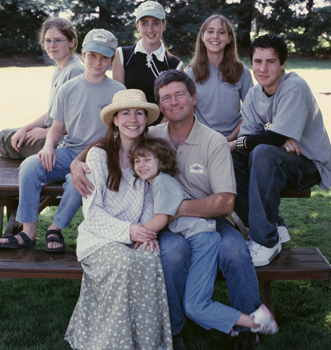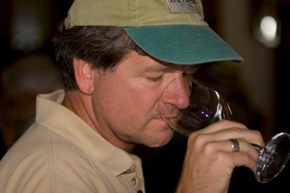Greg La Follette is one of the most revered winemakers in Sonoma County, if not the entire wine industry. His wines at both Flowers and his own label, Tandem Wines, have earned numerous accolades. In person, however, his prominence seems more like water under the bridge. Strikingly unpretentious and engaging, Greg La Follette shows far more interest in what you think about his wines today than he does about how they score or what critics say. IntoWine had the good fortune of chatting with Greg recently about winemaking, terroir, and the blessed curse of wine scoring systems.
Your career path has taken you from UC Davis to Beaulieu Vineyard to Kendall-Jackson to Flowers Vineyard to the present with your own Tandem label and your consulting work. Who have been your biggest influences along the way and how did these people help shape you as a winemaker?
#1 My mom and dad, who taught me the most important things about winemaking, which have little to do with actually winemaking and everything to do with how to treat people. Andre Tchelistcheff taught me how to “live the wine”. My wife taught me how to live life, and my kids continue that lesson, whether I like it or not! Winemaking is a team (in my case familial) sport!

Spend time with your wines – get to know them! Wines are like kids and spouses – they need you to spend time with them and get to understand them before you do anything life-changing to them. If you did something that was completely life-changing for or to your significant other and you didn’t have a pretty good clue that this is what she (he) wants or needs, you are destined to a pretty short or unhappy relationship, or both. Pinot is like this.
You are renowned as a great maker of both Chardonnay and Pinot Noir. Do you find there are advantageous synergies in making both well? That is, how does Pinot Noir making expertise make you a better Chardonnay maker and vice versa?

The points based systems commonly used to rate wines have their pro's and con's, some obvious and some not. Having witnessed the evolution of these points based system first hand, what are the positives and negatives you have seen?
The positives are that consumers have some kind of a system in going through the gazillions of wines that are out there. It would be a daunting task to ferret through all the wines without some kind of a signpost. The negatives are less reliance on your local bottle shop with knowledgeable staff that has spent the time and effort to taste through everything and can communicate their efforts to the consumer. Wines become less of a hand-sell.
Also, the two top US wine critics have decidedly parked their top scores in the camp of high % of new oak and very, very ripe fruit. This has REALLY pushed the winemaking (for winemakers and labels who are concerned about economic viablility) to the ultra-ripe, ultra-oaked wine style. It sucks big-time, but this is the current reality driven by the top critics if you want to get good scores. This is a HUGE negative and I wish to God that something could be done about this.
How have these ranking systems impacted you as a winemaker and consultant?
Clients in the US are increasingly more interested in having me create a wine that will “score well” rather than make a wine that is true to its origin (see above comment/question). For international clients, with wines destined for sale in Europe, this is NOT the case and I’m pretty much free to make wines that are authentic to their terroir. This is in part due to European sensibilities of the wine scene and in part due to reporting and focus of European wine mags.
What do you look for in a grape?

What is your view on terroir?
Unfortunately, my view is not the same as the top wine critics in the US, which is rapidly leaving terroir in the view of the rear-view mirror. The US is moving FAST away from terroir, which is a real pity, but it fits with the commercialization and corporatization of US wines. Terroir is all about presence and isn’t screwed up by big oak and ultra-ripeness (see above comments). Expression of terroir takes time and patience, takes years of listening to the wine and the vineyard, and becoming a part of the process rather than dictating to the wine where you want it to go.
It is a partnership, an effort done in tandem with the earth, and is fastly, in this day and age of mass marketing and internet buzz, becoming a real casualty of our times. I am speaking to this from over two decades of living the wine, without numbers from the lab or scores from the wine mags or even internet hype. I encourage everyone to get out there and try different wines from different regions, not the top-scoring wines but the solid labels that have been there for years, and experience for yourselves what true terroir means.
How did Tandem come about?
There was a group of us who had been at Flowers, and several of us at Hartford Court, and a whole bunch of growers that I had been working with for many, many years and over several projects, who really wanted to express the terroir of our sites and our efforts. Tandem is a result of that long-term partnership with the land.
Tell us about your wines:
Taste them and form your own opinions. For winemaking techniques, etc., please visit our web site. We are nutty passionate and uncompromising about terroir expression, we are counter-culture about points, and all about hand-sell. When you taste our wines, please do e-mail or call us and tell US what YOU think about our wines!
Where can they be purchased?
Visit our web site, www.tandemwinery.com, to order our wines or find out which states they are distributed in.




